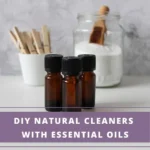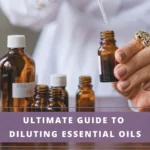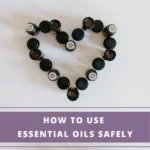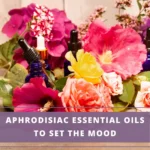As an Amazon Associate I earn from qualifying purchases. See Full Disclosure Here
Derived from the leaves of the eucalyptus tree, Eucalyptus essential oil offers a wide range of benefits for everyday use.
This versatile essential oil is known for its refreshing aroma and its ability to clear congestion, soothe muscle pain, and ease headaches.
These 25 ways to use eucalyptus essential oil in your daily routine highlight some of the many ways that you can fully experience its incredible properties.
Eucalyptus Essential Oil Components & Properties
 A look at the main chemical components of eucalyptus essential oil is key to understanding its powerful benefits.
A look at the main chemical components of eucalyptus essential oil is key to understanding its powerful benefits.
Eucalyptus essential oil is rich in eucalyptol also known as 1,8-Cineole. I looked through this research study, which details everything about this powerful compound, from its physical description and chemical reactions to its therapeutic properties and uses. A read through the article explains a lot about the many amazing benefits of eucalyptus essential oil.
According to another study, 1,8-cineole has anti-oxidative and anti-inflammatory properties that make it beneficial as a long-term therapy in the prevention of COPD exacerbations and to improve asthma control.
There are several other research studies that support the respiratory and other therapeutic effects of eucalyptol and thereby the benefits of eucalyptus essential oil.
In addition, eucalyptus oil also contains other compounds, including terpineol, limonene, pinene, camphor, eudesmol, and cynene. These compounds contribute to its antibacterial, antiseptic, antifungal, stimulant, anti-inflammatory, disinfectant, and cleansing properties.
With such a diverse range of beneficial qualities, it’s no wonder that eucalyptus oil has been used for centuries across different cultures.
Here’s a look at the many ways in which you can harness the power of eucalyptus oil in your everyday life.
I’ve listed the ways to use eucalyptus essential oil in this order:
Respiratory Issues
Pain Relief
Overall Wellness
Skin and Hair Care
Natural Disinfectant
Uses Around the Home
How To Use Eucalyptus Essential Oil For Respiratory Issues
1. Clear Sinuses with Eucalyptus Steam Inhalation
 Eucalyptus is the best essential oil for sinus infection and congestion.
Eucalyptus is the best essential oil for sinus infection and congestion.
Its high eucalyptol content is what makes eucalyptus essential oil such a powerful decongestant. Eucalyptol works to relieve congestion by diluting and draining out the thick fluids from the sinus cavities.
Eucalyptus essential oil is a common ingredient in many over-the-counter balms, salves, and inhalers for colds, flu, congestion, and coughs. If you’ve used any of these remedies before you’ll recognize its distinctive sharp and refreshing aroma.
When you’re dealing with a cold or the flu, or struggling with sinus congestion, inhaling eucalyptus essential oil can offer much-needed relief.
Remember, eucalyptus oil should only be used as a support therapy for respiratory issues. It shouldn’t be used as a replacement or substitute for any medication that your doctor prescribes, especially if the symptoms are severe.
Related: Best essential oils for congestion and colds
2. Calm Chest Cough With A Eucalyptus Chest Rub
 In addition to congestion and sinusitis, eucalyptus is also the best essential oil for easing other respiratory problems including coughs. Its decongestant properties help the respiratory system get rid of mucus faster for quicker relief.
In addition to congestion and sinusitis, eucalyptus is also the best essential oil for easing other respiratory problems including coughs. Its decongestant properties help the respiratory system get rid of mucus faster for quicker relief.
Remember, essential oils should always be diluted for topical use. To make a soothing chest rub for congestion and coughs, dilute eucalyptus essential oil with a carrier oil such as coconut or sweet almond oil.
The recommended dilution is 2%, which is 3 drops of essential oil with 1 teaspoon carrier oil. This dilution ensures that the oil is safe and gentle on the skin. Gently massage it onto your chest and throat area.
The chest is the best pulse point for applying essential oils to calm a chest cough.
Eucalyptus oil gets absorbed into the skin and enters the bloodstream. The oil’s natural properties, including its anti-inflammatory and decongestant qualities, get absorbed by the skin and help to open up your airways and relieve congestion.
3. Boost Immunity
The components found in eucalyptus essential oil are proven to provide effective immune system support.
It works to boost the immune system by stimulating the cells that support immunity.
If you are susceptible to catching infections, this is a handy oil to have with you when flu season comes around or if you are going to be exposed to large crowds of people.
Put a few drops on a handkerchief and inhale the vapors every once in a while to get the immune-boosting benefits of eucalyptus oil.
Related: Best essential oils for immune system support
How To Use Eucalyptus Essential Oil For Pain Relief
4. Soothe Muscle Pain with Eucalyptus Massage Oil
Eucalyptus oil’s analgesic and anti-inflammatory properties make it an excellent choice for relieving muscle pain.
Create a pain-relieving massage oil by mixing 8 drops of eucalyptus oil, 4 drops of lemongrass essential oil, and 1/2 cup of coconut oil. All three oils have analgesic properties. Together they make a powerful pain-relief combination.
Lemongrass oil is another essential oil that helps soothe sore muscles. Add 4 drops of lemongrass essential oil to boost the pain-relieving properties.
Gently massage the mixture onto the affected area, allowing the oil to penetrate and soothe your muscles.
This study suggests that eucalyptus oil inhalation may be used as an effective intervention for pain relief after total knee replacement.
Related: Best essential oils to soothe sore muscles
5. Ease Tension and Headaches with Eucalyptus Aromatherapy
 Eucalyptus features high on the list of 10 best essential oils for tension headaches along with peppermint.
Eucalyptus features high on the list of 10 best essential oils for tension headaches along with peppermint.
When you inhale the aroma of eucalyptus, its proven analgesic and anti-inflammatory properties work to reduce the pain.
There are several ways to use eucalyptus essential oil to ease tension and headaches.
Inhale the aroma of eucalyptus oil directly from the bottle or by adding a few drops to a tissue and inhale. Add a few drops to a diffuser, or in the shower. Or use a pre-diluted roll-on with eucalyptus essential oil.
Close your eyes, take deep breaths, and allow the soothing scent of eucalyptus to help alleviate tension and promote relaxation.
Related: Best essential oils for headaches
6. Relieve Headaches with Eucalyptus Headache Balm
Homemade eucalyptus headache balm is easy to make and is a safe and effective remedy to have on hand to soothe frequent headaches. Cineol, menthol, and camphor are all ingredients used in store-bought balms and eucalyptus oil contains all of these components.
To make a eucalyptus headache balm
Melt 1/4 cup of shea butter and 1 tablespoon of beeswax pastilles.
Add 3 drops each of eucalyptus, peppermint, and Roman chamomile essential oils.
Mix the liquid ingredients well and pour into small balm containers while still warm. Leave it to set and solidify.
Gently rub the balm on your temples and forehead to soothe tension or sinusitis headaches.
How To Use Eucalyptus Essential Oil For Overall Wellness
7. Improve Focus and Concentration with Eucalyptus Aromatherapy
Enhance your focus and concentration with the help of eucalyptus aromatherapy.
Sprinkle a few drops of eucalyptus oil on a tissue or handkerchief and deeply inhale as needed.
You can also use a portable aromatherapy inhaler filled with eucalyptus oil for on-the-go focus and mental clarity.
Related: Best essential oils for focus and concentration
8. Overcome Jet Lag
This is my top choice of essential oil for overcoming jet lag, a common struggle when traveling across multiple time zones. Jet lag occurs due to a disruption in the body’s circadian rhythm, the internal body clock that regulates sleep-wake patterns.
What makes it so effective is that eucalyptus essential oil works through multiple pathways to mitigate the symptoms of jet lag.
– The invigorating and uplifting aroma of eucalyptus oil combats feelings of fatigue, depression, and irritability that often accompany jet lag. Inhaling the oil can enhance your mood and provide a mental boost.
– Inhaling the aroma of eucalyptus oil can enhance mental clarity and focus, making it easier to stay awake and alert during the day, even when your body is signaling it’s time to sleep.
– Jet lag can sometimes exacerbate respiratory issues. Eucalyptus oil is known for its decongestant properties, which can help ease breathing difficulties, especially in dry or unfamiliar environments.
– The stimulating scent of eucalyptus oil can provide a natural energy boost. If you’re trying to stay awake until a more appropriate local bedtime, inhaling eucalyptus oil can help keep drowsiness at bay.
Along with a bottle of eucalyptus essential oil for jet lag, I recommend also carrying a personal inhaler, which you can use any time anywhere. Another option is to carry a portable diffuser to use in your hotel room.
You can add eucalyptus oil to aromatherapy jewelry for a personal diffuser you can wear everywhere but the effect is very mild.
9. Create a Refreshing Shower Experience with Eucalyptus Oil
Turn your daily shower into a refreshing and invigorating experience with eucalyptus oil.
Place two drops of eucalyptus oil directly onto the shower floor while showering. The steam from the water will release the aroma of eucalyptus, creating a spa-like ambiance and leaving you feeling clear and revitalized.
Related: How to use essential oils in the shower
10. Perk Up Tired Feet With A Relaxing Foot Soak
After a long day, treat your feet to a relaxing soak infused with eucalyptus oil. Fill a foot soak tub with hot water and add 10 drops of eucalyptus oil and 1 cup of Epsom salts.
Soak your feet for 15 minutes, allowing the soothing properties of eucalyptus oil to relieve tension and rejuvenate tired feet.
Related:Epsom salt foot soak recipes to soothe tired, achy feet
11. Enhance Meditation and Yoga Practices with Eucalyptus Aromatherapy
Deepen your meditation and yoga practices with the calming and grounding effects of eucalyptus aromatherapy.
Diffuse eucalyptus oil during your sessions to create a serene and focused atmosphere. The soothing aroma of eucalyptus will help clear your mind and enhance your overall experience.
Related: Best essential oils for meditation
12. Experience Relaxation and Improved Sleep with Eucalyptus Diffusion
Create a tranquil atmosphere and promote restful sleep with eucalyptus diffusion.
Add a few drops of eucalyptus oil to a diffuser and let the calming aroma fill your space. The aromatic compounds of eucalyptus oil will promote feelings of relaxation and prepare your mind and body for a peaceful night’s sleep.
13. Add Eucalyptus Essential Oil To Massage Oil Recipes
What makes eucalyptus essential oil a fantastic addition to a massage oil recipe? So many reasons:
Eucalyptus oil possesses natural analgesic and anti-inflammatory properties, making it highly effective for soothing muscle tension and discomfort. When added to massage oil, it enhances the relief provided during a massage, particularly if you have sore or tense muscles.
Eucalyptus oil’s refreshing scent can have a calming and mood-enhancing effect, making the massage experience more relaxing and enjoyable and promoting an overall sense of well-being.
Inhaling the invigorating aroma during a massage session helps clear nasal passages and promote easier breathing. This is especially beneficial if you’re dealing with congestion or respiratory issues.
When incorporating eucalyptus essential oil into a massage oil recipe, it’s essential to dilute it properly with a carrier oil (such as sweet almond, coconut, or jojoba oil) to avoid skin irritation. The recommended dilution ratio is 2 drops eucalyptus to 2 teaspoons of carrier oil.
14. Revitalize Your Bath
Adding eucalyptus essential oil can transform an ordinary bath into a rejuvenating spa-like experience.
All studies indicate that eucalyptus essential oil soothes muscle aches, eases tension headaches, and relieves congestion. What better way to get relief from those nagging aches and pains or the persistent discomfort than by soaking in a warm eucalyptus oil bath!
Whether you’ve had a physically demanding day or just need to unwind, this combination can offer much-needed relief.
As you add a few drops to your bathwater, the fresh and invigorating aromatic steam that rises will leave you feeling refreshed and re-energized.
The revitalizing effect of eucalyptus oil in your bath extends to your overall well-being. It can help you feel more energetic, focused, and ready to face whatever comes next.
Related: How to use essential oils in the bath
How To Use Eucalyptus Essential Oil For Skin & Hair Care
15. Manage Acne with Eucalyptus Spot Treatment
Acne is commonly caused or exacerbated by the presence of Propionibacterium acnes, a type of bacteria that naturally resides on the skin. When these bacteria become trapped within hair follicles, they proliferate within the clogged pores, triggering an inflammatory response that leads to the development of acne and inflammation.
Eucalyptus essential oil can be a valuable ally in the battle against acne due to its potent antibacterial properties. Eucalyptol, the principal component in the oil, demonstrates strong antibacterial and anti-inflammatory effects, making it effective in targeting these acne-causing bacteria and reducing the severity of breakouts.
To use eucalyptus essential oil for acne, dilute it to 2% (3 drops of eucalyptus with 1 teaspoon carrier oil). Gently apply over affected areas using a clean cotton ball or Q-tip.
Apply to clean face at least 2 to 3 times a day. At the end of the day, apply and leave it on overnight. Wash your face as usual in the morning.
16. Soothe Skin Irritation with Eucalyptus Topical Application
To soothe skin irritation and discomfort, dilute a few drops of eucalyptus oil in a suitable carrier oil, such as coconut or almond oil, and apply it to the affected area.
The anti-inflammatory and soothing properties of eucalyptus oil will help alleviate redness, itching, and inflammation.
Boost the soothing properties of your body lotion by adding 1 drop of eucalyptus oil before applying it over your body. Remember, never use any essential oil on the skin without first diluting it.
17. Soothe Insect Bites with Eucalyptus Roll-On Oil
 Eucalyptus oil contains several compounds that provide relief from itching, inflammation, and discomfort, making this a great natural remedy for soothing bug bites.
Eucalyptus oil contains several compounds that provide relief from itching, inflammation, and discomfort, making this a great natural remedy for soothing bug bites.
Its eucalyptol content has anti-inflammatory effects. When applied to bug bites, it can help reduce swelling and redness, alleviating the discomfort associated with the inflammation.
Bug bites can sometimes become infected if scratched or irritated. Eucalyptus oil’s antimicrobial properties can help prevent infection by keeping the affected area clean.
The oil also acts as a mild local anesthetic, which helps numb the area around the bug bite. This numbing effect reduces the perception of pain and itching.
Last but least, eucalyptus oil has a cooling effect on the skin, which provides immediate relief from the itching and burning that often accompanies bug bites.
To use eucalyptus oil for bug bite mix a few drops of with a carrier oil, like coconut oil, to avoid skin irritation, and then apply the diluted oil directly to the bug bite.
Combine eucalyptus oil with shea butter or beeswax to create a soothing balm that can be applied to multiple bug bites.
18. Boost Hair Health with Eucalyptus Oil
Eucalyptus oil offers several benefits for both hair and scalp health, making it a versatile and valuable addition to your hair care routine.
It stimulates hair follicles and promotes blood circulation to the scalp. This increased blood flow can contribute to healthier, more robust hair growth. 1,8-cineole, a component of eucalyptus oil helps strengthen hair so it is less prone to damage.
Eucalyptus oil can add a natural shine to your hair while also making it feel softer and more manageable.
To use eucalyptus oil for your hair and scalp, can add a few drops to your shampoo or conditioner, or create a homemade hair mask by mixing it with a carrier oil such as coconut or jojoba oil.
Apply the mixture to your scalp and hair, leave it on for a short period (usually 15-30 minutes), and then rinse thoroughly.
Be sure to dilute the eucalyptus oil properly to avoid skin irritation, and perform a patch test if you have sensitive skin. With regular use, eucalyptus oil can contribute to healthier, more vibrant hair and a nourished, balanced scalp.
19. Soothes Itchy Scalp
The antimicrobial and antifungal properties of eucalyptus essential oil help combat dandruff, soothe an itchy scalp, and prevent the growth of microorganisms that contribute to various issues.
Massaging eucalyptus oil into the scalp can deeply cleanse the scalp, remove product buildup, and soothes any annoying itchiness caused by excessive oiliness or dandruff.
For an excellent nourishing and moisturizing scalp and hair mask, mix a few drops of eucalyptus oil with a carrier oil such as coconut or olive oil and massage this blend into your hair. Leave this hair mask on for at least 20-30 minutes before washing it off.
To soothe an itchy scalp, rub the same blend into the scalp and leave on for a while before washing off.
How To Use Eucalyptus Essential Oil As Disinfectant
20. Clean & Disinfect Cuts And Scrapes
The antiseptic properties of eucalyptus essential oil make this a handy first-aid alternative to disinfecting minor cuts, scrapes, and insect bites.
Dilute a few drops of eucalyptus oil in a suitable carrier oil and apply it to the affected area. The antibacterial properties of eucalyptus oil will help prevent infection and promote healing.
This study suggests that highly diluted eucalyptus oil (1%) can be used as a safe, natural alternative for cleaning and disinfecting minor wounds.
Caution: Only use this on superficial wounds. Never apply essential oils over open or deep wounds as it could make things worse.
21. Fight Foot Odor with Eucalyptus
Wearing closed shoes for prolonged periods can sometimes cause sweaty feet. The moisture creates a breeding ground for harmful microbes that cause foot odor.
The strong antibacterial, antifungal and deodorizing properties of eucalyptus make it an effective natural remedy for fighting foot odor. It works by killing odor-causing bacteria and fungi that thrive in the warm, moist environment of sweaty feet and are a primary cause of foot odor.
The fresh, clean aroma of eucalyptus oil acts as a natural deodorant, neutralizing unpleasant odors.
To use eucalyptus oil for combating foot odor, add a few drops of eucalyptus oil to a basin of warm water and soak your feet for 15-20 minutes. This will help kill bacteria and fungi while leaving your feet feeling refreshed.
Another option is to create a foot spray by mixing eucalyptus oil with water and then spritzing it on your feet before putting on shoes and socks. This provides a refreshing, deodorizing effect.
To delay foot dampness, mix eucalyptus oil with cornstarch or arrowroot powder to create a natural foot powder. Dust your feet with this powder before putting on shoes to help absorb sweat and reduce odors.
Remember to dilute eucalyptus oil properly to prevent skin irritation, especially if you have sensitive skin.
22. Disinfect Tooth & Makeup Brushes
With its natural antibacterial and antifungal properties, eucalyptus essential oil offers a fantastic solution for maintaining clean and germ-free toothbrushes and makeup brushes.
Add a few drops of eucalyptus oil to the cup of warm water and keep your toothbrush or makeup brush separately to soak in the eucalyptus-infused water for a few minutes.
Do the same for your makeup brushes. These accumulate product residue and can become a breeding ground for bacteria if not cleaned and disinfected regularly.
23. Clean and Deodorize Surfaces with Eucalyptus All-Purpose Spray
The antibacterial and purifying properties of eucalyptus essential oil make it an excellent green cleaning alternative.
Create a surface spray by mixing 15 drops of eucalyptus oil and 10 drops of lemon oil with 1/2 cup vinegar and ½ cup water in a spray bottle. Shake well before each use, and spray the mixture on surfaces to clean and deodorize.
How To Use Eucalyptus Essential Oil Around the House
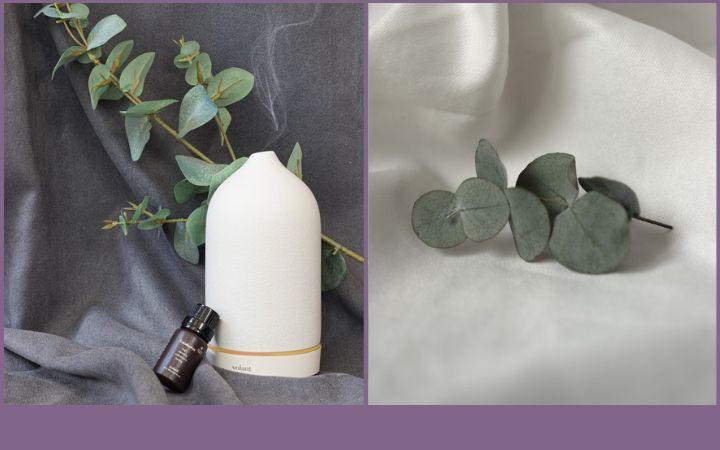 24. Create a Nontoxic, Invigorating Room Spray with Eucalyptus Oil
24. Create a Nontoxic, Invigorating Room Spray with Eucalyptus Oil
To freshen the air in your home and create a nontoxic invigorating atmosphere, make your own room spray using eucalyptus oil.
In a spray bottle, combine 15 drops of eucalyptus oil, 10 drops of lemon oil, and 1 cup of water. Shake well before each use, and spray the mixture around your home to enjoy the uplifting and cleansing aroma of eucalyptus.
25. Diffuse eucalyptus essential oil to freshen indoor air
Diffusing eucalyptus oil into the air can help to freshen the air, reduce stress, and improve mood. To diffuse eucalyptus oil, add 5-10 drops of oil to your diffuser and turn it on.
You can use any type of diffuser for the purpose – nebulizer, ultrasonic device, passive diffuser, or reed diffuser.
Make your own homemade reed diffuser with eucalyptus essential oil.
26. Boost Laundry Freshness
Add a few drops to your laundry to give your clothes a refreshing scent.
27. Ward Off Insects with Eucalyptus Repellent
Eucalyptus oil’s natural insect-repellent properties make it an effective alternative to chemical-laden repellents.
Create your own eucalyptus insect repellent by combining 10 drops of eucalyptus oil with 1 cup of water in a spray bottle. Shake well before each use, and spray the mixture onto your skin and clothing to deter insects.
Oils that Blend Well with Eucalyptus Oil
Eucalyptus essential oil blends well with Lavender, Rosemary, Cedarwood, and Thyme essential oils for diffusion.
Precautions When Using Eucalyptus Essential Oil
 When using eucalyptus essential oil, it’s essential to observe some precautions to ensure safe and effective use. Here are the key precautions:
When using eucalyptus essential oil, it’s essential to observe some precautions to ensure safe and effective use. Here are the key precautions:
Eucalyptus oil is highly concentrated and can be irritating to the skin if applied undiluted. Always dilute it with a suitable carrier oil, such as coconut oil, before applying it topically. A general guideline is to use 1-2 drops of eucalyptus oil per teaspoon of carrier oil.
Before using eucalyptus oil on a larger area of the skin, perform a patch test on a small, inconspicuous area to ensure you don’t have an adverse skin reaction. Wait 24 hours and check for any redness, irritation, or discomfort.
Avoid applying eucalyptus oil near sensitive areas like the eyes, ears, or mucous membranes, as it can cause irritation.
Eucalyptus oil should not be ingested. Ingesting eucalyptus oil can be toxic and cause serious health issues. It’s meant for external use only.
Use eucalyptus oil with caution around children and pets. It can be toxic if ingested, and strong aromas may be overwhelming for them.
Pregnant or nursing women should consult with a healthcare professional before using eucalyptus oil. Some forms of eucalyptus can be unsafe during pregnancy and breastfeeding.
If you have underlying health conditions or are taking medications, consult a healthcare provider before using eucalyptus oil, especially if you plan to use it for therapeutic purposes. This is because eucalyptus oil does not react well with some anti-asthmas medications
Store eucalyptus oil in a cool, dark place, away from direct sunlight and out of the reach of children. Ensure the cap is tightly sealed to prevent evaporation and contamination.
Quality matters. Use high-quality, pure eucalyptus essential oil from a reputable source to ensure safety and effectiveness. Lower quality or adulterated oils may not provide the desired benefits and can be less safe for use.
Consult a Professional: If you’re unsure about using eucalyptus oil or have any concerns, it’s always a good idea to consult with an aromatherapist, healthcare provider, or qualified essential oil practitioner for guidance.
By following these precautions, you can safely enjoy the many benefits of eucalyptus essential oil and avoid any potential adverse effects.
One last note
I see a lot of sites recommending the use of eucalyptus essential oil as a mouth freshener so I checked several studies and I would strongly advise using it as a mouth freshener or for internal oral use.
Essential oils are generally not safe for ingestion, and using them in this manner can be harmful. Eucalyptus oil can be toxic if swallowed and may lead to adverse reactions, including nausea, vomiting, and digestive issues.
Always exercise caution and prioritize your health when using essential oils, especially when it comes to oral applications.
Eucalyptus oil is a powerhouse essential oil that offers a multitude of benefits for your everyday life. From relieving congestion and soothing sore muscles to purifying the air and promoting relaxation, the versatility of eucalyptus oil is truly remarkable.
Incorporate these 25 ways to use eucalyptus oil into your routine safely and experience the incredible properties it has to offer.
Where To Buy Eucalyptus Essential Oil
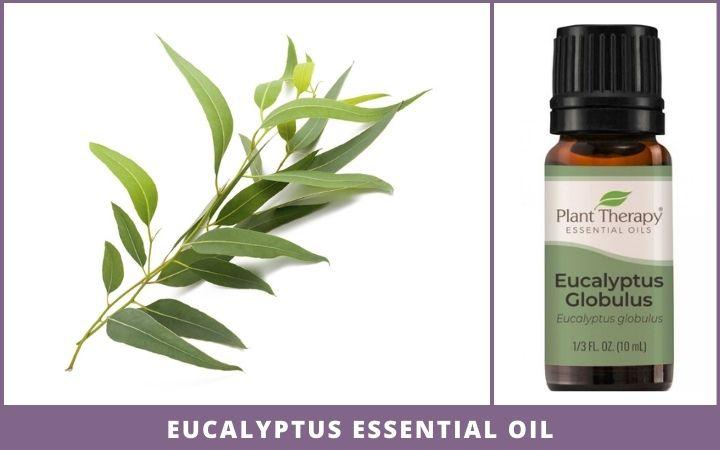 My top two recommended brands to buy 100% pure, high-quality eucalyptus essential oil are:
My top two recommended brands to buy 100% pure, high-quality eucalyptus essential oil are:
Disclaimer: This information is not intended to serve as medical advice. Please consult your doctor before using any natural medication or if you experience any unusual symptoms. See Full Disclaimer here.


